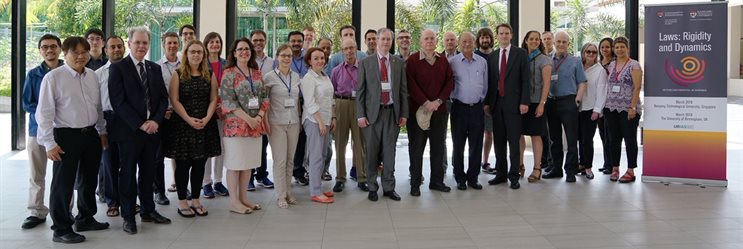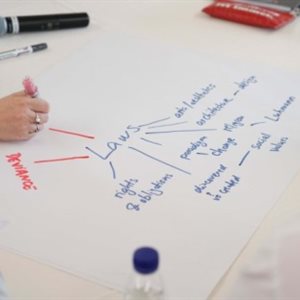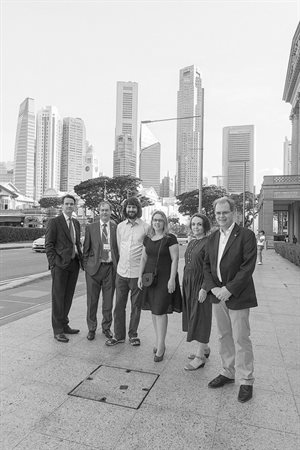Update on ICA 3 - Laws: An Intellectual Adventure
- Dates
- Monday 19 March (09:00) - Tuesday 27 March 2018 (16:30)

View of the ICA – Alastair Wilson
There was a sense of vertigo at the beginning of the ICA, as it became clear how much ownership we as Fellows were to have over the whole process – and the rarefied company of numerous intellectual heavyweights no doubt contributed. As a group the Fellows had a strong drive to find projects with which everyone could engage constructively, and we invested a lot of time in exploring the nature of interdisciplinary work and how to go about it effectively before settling on more specific topics concerning aspects of the Laws theme.
Totally interdisciplinary work is incredibly challenging, and it was of particular value to me to have Professor Patrick Geary (Princeton IAS) present for the whole event; his immense experience in working with people from very different fields, combined with his unfailing good humour, were a big factor in keeping the group’s momentum going.
 Apart from the main interdisciplinary group work, the most exciting aspect of the ICA for me was the opportunity to talk directly – over breakfast, lunch, dinner, or drinks – with world leaders in fields very different from my own and especially with highly distinguished academics with panoramic views of their fields. I benefited especially here from the several extraordinary senior physicists, and I won’t forget the conversations we had together – while often very challenging to my own way of looking at things, they strengthened my conviction that philosophy in general, and philosophy of science in particular, has something indispensable to contribute to the broader interdisciplinary conversation.
Apart from the main interdisciplinary group work, the most exciting aspect of the ICA for me was the opportunity to talk directly – over breakfast, lunch, dinner, or drinks – with world leaders in fields very different from my own and especially with highly distinguished academics with panoramic views of their fields. I benefited especially here from the several extraordinary senior physicists, and I won’t forget the conversations we had together – while often very challenging to my own way of looking at things, they strengthened my conviction that philosophy in general, and philosophy of science in particular, has something indispensable to contribute to the broader interdisciplinary conversation.
Irina Kuznetsova
This workshop was completely different in comparison to all of the other summer schools, conferences or workshops that I have taken part in. From the start, the program was discussed and co-designed with the fellows, and during the workshop there was the flexibility to amend some sessions because of emerging ideas. It was an absolutely fantastic feeling to be in academic atmosphere for an extended period that was not divided by departments and disciplinary boundaries, and to be able to look at issues from angles which I had not considered before. I am a social geographer, though my education was within sociology, social philosophy and psychology, but other fellows represented Physics, Computer Science, Cyber Criminology, Law, Neuropsychology, Architecture, Sociology, Anthropology, Linguistics and Philosophy. As one of the mentors, Professor Ada Yonath who received the Nobel Prize in Chemistry, although she is a Biologist, for her studies of ribosome, stated that disciplinary boundaries often are relative and it is the scientific issue that is the driving force.
 There is not enough space to list all of the talks, but amongst the most inspiring was Professor Penny Andrews’ lecture on the gaps between the South African Constitution, its presumption of human rights and the deep social inequality and the persistence of a culture of masculinity from and Professor Wang Gungwu’s fascinating analysis of Chinese Historiography and the role of Government. Also, we had brilliant mentors, among those I want to thank most of all are Patrick Geary, Partha Dasgupta, Ernst Rank and Michel Spiro, and thanks to the IAS teams at the University of Birmingham and NTU who made it all possible.
There is not enough space to list all of the talks, but amongst the most inspiring was Professor Penny Andrews’ lecture on the gaps between the South African Constitution, its presumption of human rights and the deep social inequality and the persistence of a culture of masculinity from and Professor Wang Gungwu’s fascinating analysis of Chinese Historiography and the role of Government. Also, we had brilliant mentors, among those I want to thank most of all are Patrick Geary, Partha Dasgupta, Ernst Rank and Michel Spiro, and thanks to the IAS teams at the University of Birmingham and NTU who made it all possible.
What next? We have started to work on collaborative texts, to look for funding opportunities, but the main outcomes I already have - the impulse to think differently and new friends from all over the Globe.
There will also be interim meetings in Munich and Princeton.